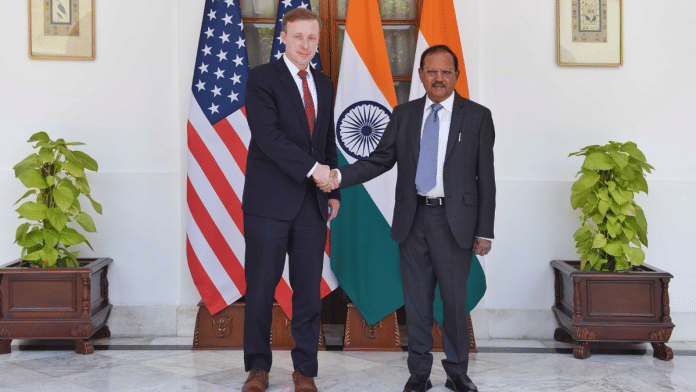New Delhi: US National Security Adviser Jake Sullivan arrived in New Delhi Monday on a two-day trip with a multi-faceted agenda ranging from military to critical material cooperation, Indo-Pacific and the Gurpatwant Singh Pannun assassination plot. This is the first high-profile American visit to India within days of the Modi 3.0 government taking over.
Incidentally, he landed on the day news arrived from the US that Indian national Nikhil Gupta — accused of attempting to kill Sikh separatist Pannun — had been extradited from the Czech Republic.
Government sources told ThePrint that the Pannun issue was not officially on the agenda of talks, but said it was quite natural it could come up. They said the Indian side could brief Sullivan on what the high-level probe committee set up by the Modi government has found and action taken thereafter. Sources, however, would not elaborate on what the committee had unearthed so far.
Analysts saw the visit as important for the Joe Biden administration as it goes into election mode. What was at stake for both countries was bigger than differences and the effort was to work on convergences in the relationship, sources said.
Sources also said a stronger India-US partnership was in the best interest of the two countries and others amid rise in conflicts across the world and tensions in the Indo-Pacific continuing due to Chinese military coercion against neighbours.
They said the India-US relationship should not be seen purely from a security and defence perspective but had a much larger canvass, showcasing human-to-human relations, space, technology, cyber and humanitarian domains.
Sullivan, who held talks with his Indian counterpart NSA Ajit Doval, also met with External Affairs Minister S. Jaishankar and will call on Prime Minister Narendra Modi.
Talking about the official agenda, the sources said Sullivan’s visit was at the invitation of Doval, as the duo have regular consultations on bilateral, regional and global issues. He was accompanied by a delegation of senior US government officials and industry leaders.
The current visit continues Doval and Sullivan’s high-level engagement on the robust and multi-faceted agenda of the India-US global strategic partnership, sources said.
Also read: Moscow plays hardball with New Delhi over Indians recruited into Russian military for Ukraine war
Since May 2022, following the launch of the India-US Initiative on Critical and Emerging Technologies (iCET) by Modi and Biden on the sidelines of the Quad Summit in Tokyo on 24 May 2022, the two NSAs have driven a concerted effort to engage in identified areas of collaboration.
This pertained to diverse domains of new and emerging technologies, including semiconductors, AI, quantum computing, defence innovation, space and advanced telecommunications.
In subsequent meetings, the two sides have included new areas within the iCET framework, including biotechnology, critical minerals and rare earths processing technologies, digital connectivity and digital public infrastructure and advanced materials.
The ongoing visit has given the NSAs an opportunity to review the progress and set new priorities and deliverables for iCET, the sources said.
The two NSAs also discussed bilateral issues and reviewed the India-US partnership on regional and global issues of mutual interest.
They also chaired the first annual review of iCET with an inter-departmental delegation from both countries.
On Tuesday, the NSAs will address participants at an India-US iCET roundtable with industry CEOs, organised by the Confederation of Indian Industry.
Talking about projects under discussion, sources said a key agenda was the production of Stryker-armoured personnel carriers.
Based on requirements proposed by the Indian side and on its own, the US had suggested a joint development and production of an extended range of ultra-light howitzers M777, precision-guided long-range munitions and setting up of a production facility for Stryker when it came to technology cooperation for the Army.
Sources said the Army zeroed in on the Stryker because Indian companies may have developed armoured-personnel carriers, but none of them matched the Stryker in terms of performance, weight, advancements and ease of transporting.
The US side is also pushing for the MQ-9B (predator drones) deal which is however not part of the iCET.
(Edited by Tikli Basu)






